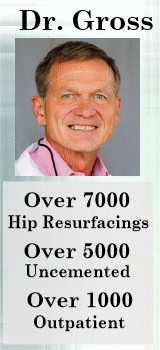Hello, I am a 37 year old former (and hopefully again in the future) athlete who recently had my right hip resurfaced with Dr. Gross in Columbia, SC, having traveled from my home in Charleston, WV for the procedure. My story and this information is for those who are scheduled for or may be considering the procedure, I would like to pass along as much information and personal experience as possible for your benefit, as so many others have done on this wonderful website.
Would like to first summarize that so far I am completely satisfied and recommend the procedure 100%. Also, I wholeheartedly recommend Dr. Gross and his wonderful practice.
As of today, Aug 15th, 2009, I am almost to the 5 week mark post-op. From the moment I woke up from the surgery, I have not had any pain in my hip more than what feels like a muscle stretching or general tightness / stiffness. There is no trace of arthritic or bone pain. I’m not sure I had any expectiations either way, as I read lots of stories both ways - people that had problems and those that sailed through. It is hard to believe that there could be no pain, not with all the wrenching around that goes on in there. Dr Gross has videos on his website showing the procedure (ha, I couldn’t bring myself to watch them until AFTER the surgery) - your hip is sliced through, dislocated, and then subjected to medieval torture devices and power tools! How can that not hurt later? But, for me, it doesn’t.
I have to say, I was feeling very sketchy in the pre-op room where they start to work on you. Needles and pills everywhere, people coming and going, doing weird things to me. And then, wheeled into the operating room. Just like on TV, with everybody in masks, and the overhead light the size of one of those old satellite dishes. I don’t remember much, but even in a sedated mode, it was scary. Then that’s it – I was out. I have heard they ask you to count or whatever, but as far as I can remember, they snuck up on me.
The first 24 hours after surgery were the hardest, but even that was not too bad. Even had it been worse, there’s not a lot of remembering due to the pain meds and the lingering sedation. I was told Dr. Gross does five surgeries a day, twice a week. Mine was on a Monday, at 9 am. That made me second in line that day. In my mind, that was great - that way he got to wake up and practice on someone else before hacking on me (ha). Seriously, though, I wonder about these things. Doctors are people too, I want them to have their A game when it’s me under there. That was really my only question during my one and only office visit – “hey, Doc, you’re not going to go out and get wasted the night before my surgery, right?” He said he wouldn’t, just for me. Sweet.
Speaking of pain meds, they gave me vicodin that first day and I think I took my prescription two or two and a half more days after that. As I said, there never was any real pain from the surgery, but they kept saying “stay on top of the pain, if you get behind, it’s harder to catch up”. Well, at that time, I didn’t know if some big pain wave was coming or not, so I took the meds. I really don’t think I needed it. Hard to tell. The only thing that hurt was when they took the catheter out on the day after surgery. That was bad. Sort of like a vacuum cleaner hose had been up there all along, and got removed along with the catheter hose. There was this weird suction feeling along with the discomfort.
A physical therapist (PT) came and helped me walk that 1st afternoon of my surgery (a mere few hours after the surgery!). The walk was with crutches, but the crutches were for balance, not to take weight off the hip. I have read that they want you to put weight on the hip to help press-fit the devices into their respective slots. The most difficult part was keeping balance considering the lingering sedation. Mostly, though, I just laid there in the bed. The PT also said to keep moving my feet and legs. She gave some prescribed motions to do.
Providence Northeast Hospital is 1st class. Everyone that I came in contact with there was super. Also the food was not too bad. The hospital is yet part of Dr. Gross’s well-established system that is wonderful.
I was told to plan for two nights in the hospital, but it ended up only being one. That first night sucked. The main reason is that it was hard to sleep with the O2 / heart monitor beeping all the time and the nurse coming in every two hours. Also, my heart rate kept going down too low, which would set off an alarm. I don’t know what was worse, the alarm, or me wondering how bad it is to have a heartbeat low enough to set off the alarm. The low heartbeat was surmised to be me being in relatively good cardiovascular shape, along with lingering sedation effects. I still hardly slept at all.
At the consultation appointment prior to surgery, they asked (made?) me to buy this cold pack machine that is basically a little igloo cooler filled with ice water, attached to a pump, some hoses, and a bandage. I mention this because had I known it was going to cost so much out of pocket for the thing, I could have purchased one on eBay, brought it with me, and saved some $$. But I wasn’t aware I would need this prior to the surgery and therefore didn’t know to ask if I could have brought my own. Anyway, cold water circulates through the bandage. I was told to bring it to the hospital. After the surgery, they kept it on my hip and leg, circulating cold water constantly. When I left the hospital, it was sent with me, and I used it every 2 hours or so, including in the car on the way home. I think that was a big help to my quick recovery, by minimizing the swelling. I have read about people with bad swelling problems; I had none.
The next day, Dr. Gross stopped by my hospital room. He asked a few questions, and advised that I could leave later that day. I was all for that. Also, a PT came by and explained some of the disabled person tools like the sock put-on device, followed by another walk. I was able to stand and take a shower. I got a little dizzy in there, which I believe was due to the heat and lingering sedation and pain meds. Fearing possible fainting, I had to get out and sit on the toilet. Later that afternoon, I was discharged from the hospital. They make you ride a wheel chair out, but I could have definitely crutched out on my own power.
The second night, which was in a hotel, also sucked. The main problem was the whole sleeping on your back thing. The main mode of sleeping the first few nights is on your back with a pillow between your legs. You are allowed to turn over on either side, as long as the pillow stays between your legs. Well obviously, I wasn’t going to lie on the operated side, and while lying on the good side, I was not confident in the ability of the operated side/leg to stay under control. That leaves the back-lying position. There’s only so long you can stay in one position before muscles get tight, and general discomfort sets in. It was not a good night. In general, the confidence of sleeping on the good side grew, and by 7-10 days, I was in a routine of moving from back sleeping to the good side every 1-3 hours, with good sleep in between. It helped me to sleep in a recliner for a day or two before moving to my regular bed. One other thing that surprised me was that I had to pee every 1-3 hours through out the night. I surmise that it was a side effect of the catheter. That very slowly went away up through the 3 week mark.
Wanted to mention that that 2nd night I had a fever that got up to 101. I was somewhat nervous about that. It’s hard to know in the moment if it’s just temporary (it was), or if it’s going to get worse. Make sure you have a thermometer with you.
On the 3rd day post-op, my wife drove me and our 2 year old daughter on the 6 hour drive back to WV. We have a CR-V, and I sat in the back seat with the front passenger seat reclined all the way back to give my legs room to stretch out. Could definitely have made it sitting in the front, it was just even better back there. The ice pack has a hand pump bulb thing, which I used to keep the cold circulating on my hip and leg. We stopped 2-3 times so I could get out and walk.
My walking progressed roughly as follows:
1->4 days - walking with crutches
5->20 days – walking with a cane or one crutch. Towards the end of that period, walked with a limp when not using the cane.
21 days -> now (34 days). Walking fine with zero assistance. Limp is almost completely gone.
Again, it seems crazy to me to walk, unassisted, with no limp, so soon. Most of the time, I have to keep reminding myself that I recently had hip surgery, lest I do too much too soon and risk damage to it. And really, my belief is that it would be hard to damage it, but I’m sure not going to chance it. Like on the stairs. I could walk up the stairs normally with no problems by 21 days. I catch myself taking two at a time on the way up (including with the operated leg!), like I used to do before the surgery, and have to slow down, since, who knows, that might not be good for it. Definitely one of the best gifts of the procedure is the “not-thinking-about-my-hip” mindset it allows, in contrast to before, where the pain when I walked consumed my attention.
Some background on my situation and events leading up to my resurfacing:
I am a former college basketball player, and have enjoyed continually playing basketball at a fairly high level up until this spring; when my hip pain finally forced me to stop. It began around 5 years ago as an occasional snap or click in there, and gradually progressed through tightness and stiffness to a slight limp in the past 2-3 years (people would ask “why are you limping?”, and I didn’t even realize I was). Couldn’t pinpoint what it was, but last spring I knew something was really wrong. An X-ray showed “severe degenerative changes” (loss of spacing superiorly, osteophytosis), basically arthritis. There’s not much positive in those adjectives “severe” and “degenerative”. Was pretty crushed by that news.
Began my research on problems of the hip. Purchased a couple of books and eventually found Surface Hippy. Visited a recommended orthopedic surgeon here in Charleston, WV. He diagnosed arthritis caused by congenital (birth defect) hip dysplasia in both hips and recommended a total hip replacement in the really bad one, noting that the other one will require one in the future. There’s another 30-something-year-old guy in my office with one of those and he’s not allowed to run on it. I mentioned hip resurfacing to this surgeon and he noted that he didn’t recommend it due to risk of femoral fracture and un-proven track record. OK, well, I have to think about this.
Was able to play basketball this past winter. Would basically take my daily Celebrex and supplement it with two ibuprofen before going out to play. By March, people were feeling sorry for me and saying I should stop. I would limp-run up and down the court. The weird thing was though, is that when I quit for good in April, it REALLY got bad. It went from a manageable limp in April to a “I can barely walk 2 blocks” severe limp by May. It was like the running and exercise had been keeping it loose. Got a cane; it was the only way I could get from my cubicle to the bathroom. Weirdly, though, I could still play golf. Would ride the cart up to my ball, cane my way the rest of the way, and then hit the ball. Lost 2-3 clubs worth of distance (due to not being able to push off with my right hip), but oddly, it didn’t hurt my scoring. I theorize that I was now playing old man golf, where it’s hard to lose any balls if you can’t hit it far enough to get into trouble, ha!
Meanwhile, the more I researched re-surfacing, the more it was crystal-clear obvious that it was the thing for me. Active, young, good-looking (oh, well, 2 out of 3 ain’t bad). It seems utterly ridiculous to cut off the top of your femur when there are other alternatives. There are so many other benefits, but if you’re reading this, you’re probably already educated as to those, so no wasting time re-preaching. How could I find out if there were any few orthopedic surgeons in this area that would do resurfacing? Call each and ask? I don’t know, I guess I could have done that. Found one that was on the Birmingham Hip website and visited him. He had only done 8 procedures. I believe it is important to have someone with lots of experience at this. That’s one thing that is so incredibly helpful about Surfacehippy - the doctor experience data. I cross referenced my insurance coverage with doctors that had significant experience (at least 100 procedures) within a 2 state radius and that gave me a manageable list to choose from. Ended up going for the high end of experience, which was Dr. Gross, and believe that was the very best choice I could have made. Will not hesitate to return to him when my other hip gives out. Definitely hope it is later rather than sooner, but I now have no fear what-so-ever about the procedure.
Wanted to also share some information about the financial end of things. Below is what I have experienced so far. I have Aetna Open Access (EPO) insurance.
1. At the doctor’s office prior to my surgery, they suggested I buy the below items, but I am unsure whether I could have refused at the time:
a. Crutches (insurance doesn’t pay for all of it) ~$15 copay with my insurance (you can bring your own if you have them, eliminating the need to purchase in the office)
b. Disabled person care package (grabber thing, long shoe horn, sock putter-on thing, and long sponge on a stick) $60
c. Polar ice pack. Mine was a Polar Care 300 model manufacturered by the Breg Company. It was $250 in the doctor’s office. The reason I list it here is that these are on sale on Ebay for $70-$100. I would have bought mine there if I would have known.
2. Dr. Gross’s office requires a pre-payment of $1,200 which is for having a Nurse Practitioner present during the surgery; they said most insurance companies wouldn’t cover that. I paid that, and am still not sure if my insurance will cover that or not. There is also a prepayment of $1,000 for some people, if their insurance won’t cover “minimally invasive technique”. I did not have to pay that one.
3. So far, my insurance website says they’ve been billed a little over $51K. Thank goodness for insurance, right?! That is definitely a lot of money, but to me, it would have been worth paying whatever.
In closing, I am less psyched about getting back on the basketball court than I was before the surgery. It may have something to do with the thrill of just walking painfree being plenty of satisfying exercise at the moment; also it’s summertime and golf season. Speaking of golf, I got the OK from Dr Gross’s office to return to the links at about the 5 week mark, so that will keep me busy until winter. Knowing myself I’ll be back on that court, though. Sweet!
That’s all I have as of now, best of luck to you with your decision, and your surgery. You are on the right path!










